#dc circuit court of appeals
Explore tagged Tumblr posts
Text
I'm sorry, but ANY other defendant in such a case would have already been jailed for attacking witnesses and prosecutors. This has NOTHING to do with free speech and everything to do with harassment and intimidation.
It is time that someone determined that Trump is NOT entitled to special treatment.
An appeals court Friday ordered an administrative stay of a gag order barring former President Trump from targeting witnesses and the prosecutors in his federal election interference case, temporarily pausing its implementation ahead of further legal battles.
The order from the D.C. Circuit court of appeals also expedites the case.
42 notes
·
View notes
Text
In the end, the return of net neutrality was short-lived: Today, the Sixth Circuit Court of Appeals struck down rules introduced by the Biden administration that would have prevented internet service providers from favoring some apps or websites over others. It’s the conclusion of a decades-long fight for a more equitable internet—and a harbinger of what may await other consumer protections in the years to come.
It’s easy to get lost in the technicalities of net neutrality, but the basic thing the Federal Communications Commission wanted was the power to prevent broadband providers from engaging in bandwidth discrimination, slowing speeds for certain customers or to certain sites. Those protections existed under the Obama administration but were rolled back shortly after Donald Trump took office in 2017. You probably won’t feel much near-term impact; we’re largely back to the status quo, and Spectrum is unlikely to immediately try slowing down YouTube to get you to watch its own cable news channels. But that’s also why the way the Sixth Circuit arrived at its decision may be even more alarming than the ruling itself.
The three-judge panel frequently cited Loper Bright Enterprises v. Raimondo, the recent Supreme Court decision that overturned a legal doctrine known as Chevron deference. Under Chevron, courts were required to defer to regulatory agencies when it came to deciding how relevant laws should be interpreted when their provisions were unclear. Now, courts are free to decide for themselves. And the Sixth Circuit did exactly that.
“Unlike past challenges that the DC Circuit considered under Chevron, we no longer afford deference to the FCC’s reading of the statute,” the ruling reads. “Instead, our task is to determine ‘the best reading of the statute’ in the first instance.”
In other words, the court substituted the subject matter expertise of the FCC with its own.
“It's a sad day for democracy when giant corporations can forum-shop for industry-friendly judges to strike down some of the most popular consumer protection rules in history,” says Evan Greer, director of the digital rights nonprofit Fight for the Future. “The court citing Loper Bright here is an alarming harbinger of industry-friendly rulings to come.”
And not just on issues affecting the broadband industry. The Sixth Circuit showed today how courts might use the end of Chevron deference to shape all sorts of policy, from tech to the environment to health care to pretty much any area where legislative ambiguity reigns.
Critics of Chevron argued that Congress too often delegated the work of interpreting policies to unelected bureaucrats working for federal agencies, says John Bergmayer, legal director at the consumer advocacy nonprofit Public Knowledge. “Now we have the alternative: The first panel of judges to hear an issue can set nationwide policy.”
There’s at least one way out of this imbalance of power, Bergmayer says: Congress can pass a bill that explicitly says agencies have the authority to interpret laws. That seems unlikely, though, in a GOP-led legislature that’s wary of—or outright hostile toward—the administrative state.
After all, Congress also could have codified net neutrality as the law of the land rather than leaving it to the FCC. Outgoing FCC chair Jessica Rosenworcel, a Democrat, still hopes that it will. “Consumers across the country have told us again and again that they want an internet that is fast, open, and fair,” Rosenworcel said in a statement. “With this decision it is clear that Congress now needs to heed their call, take up the charge for net neutrality, and put open internet principles in federal law.”
That certainly would have been preferable to forcing net neutrality to ride on a political seesaw for the past two decades, passing in and out of favor depending on who’s in charge. (Former FCC chair Ajit Pai, who rolled back net neutrality rules under Trump, hailed the Sixth Circuit’s opinion as “excellent.”) But unless and until that happens, the regulatory whiplash that takes place when a new party takes power will only fuel the courts’ willingness to take matters into their own hands—especially now that they have a green light from the Supreme Court. “Applying Loper Bright means we can end the FCC’s vacillations,” the Sixth Circuit opinion says.
There’s some good news in all this. In 2018, California passed its own net neutrality law that, after years of legal challenges, fully went into effect in 2021. Because the internet doesn’t stop at state borders, California’s law does offer some degree of protection to everyone in the US. “California’s law is quite good,” says Bergmayer. “It’s just that something nationwide would be better.”
Which means, at least, that some net neutrality protections still exist. They’re not as comprehensive as digital rights advocates hoped for and not as strong as the FCC would have granted, but it’s something. But as courts increasingly invoke Loper Bright, that won’t always be the case. The Sixth Court has shown how easily consumer and environmental safeguards can now be erased in an era when it takes only one court ruling to make them disappear.
24 notes
·
View notes
Text
Elie Mystal covered the ridiculous, “Presidential Immunity” (aka, “Why Can’t Trump Be Treated Like A Dictator?”) case before SCOTUS
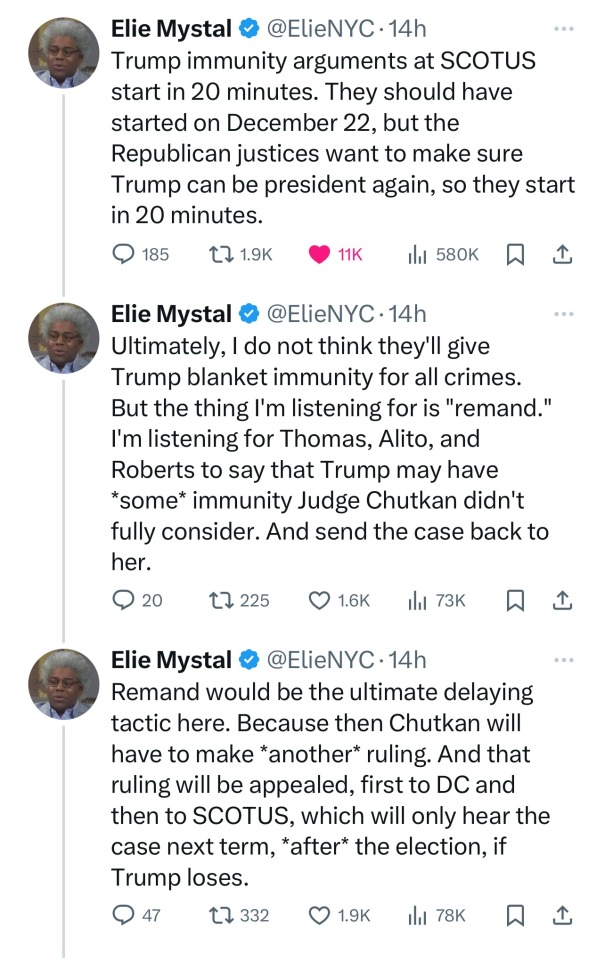
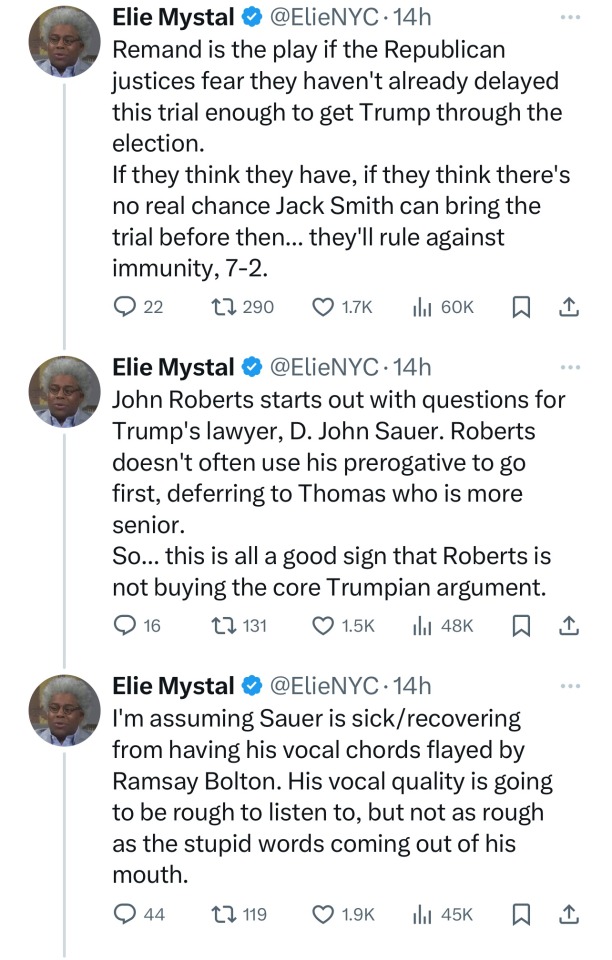
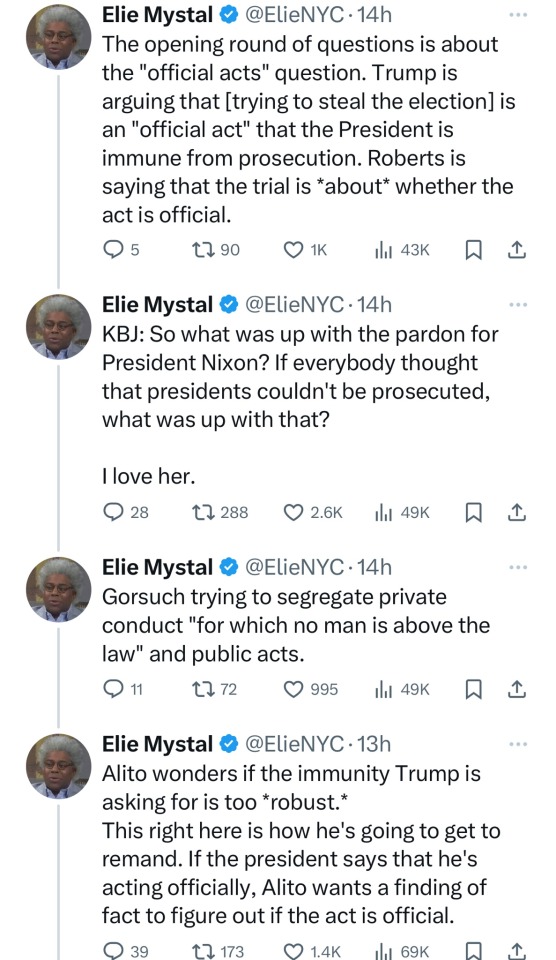
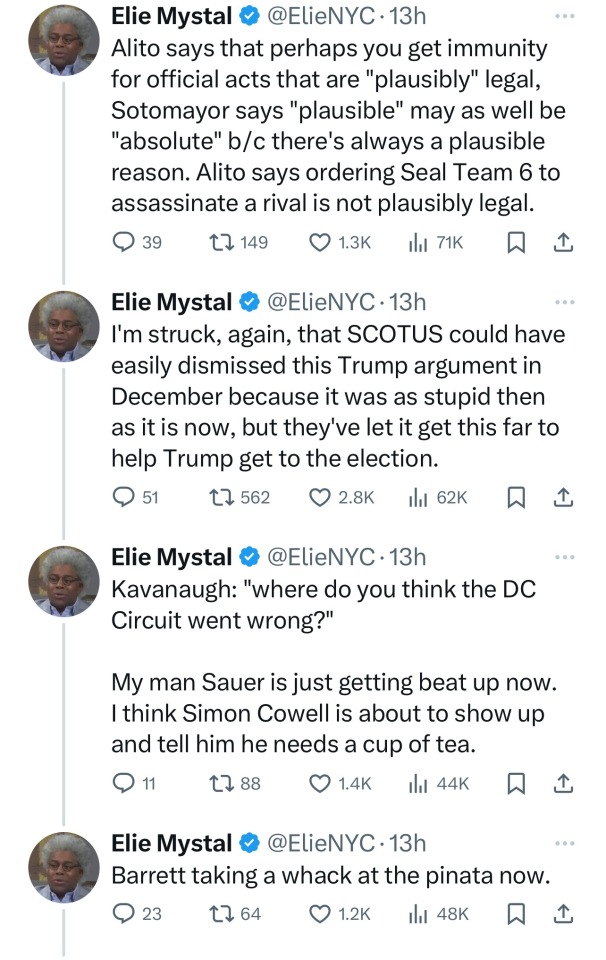
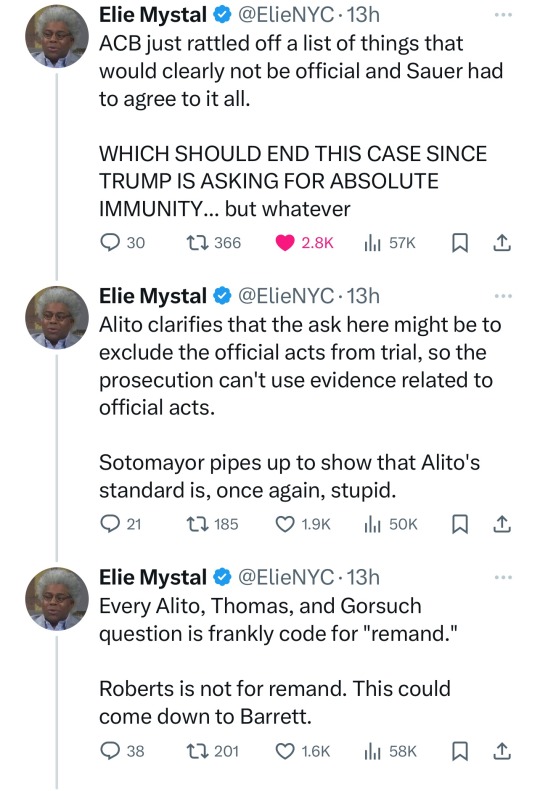
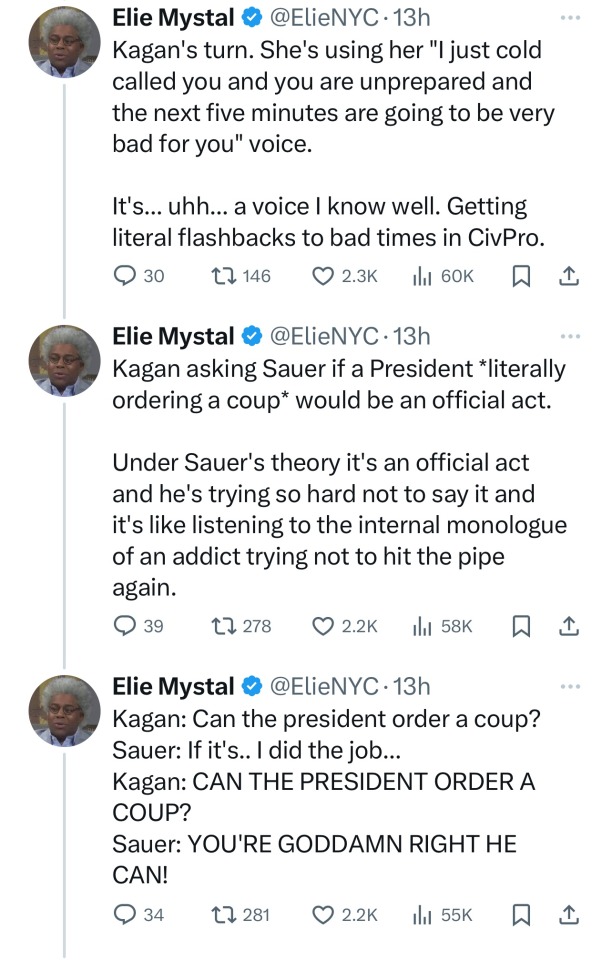
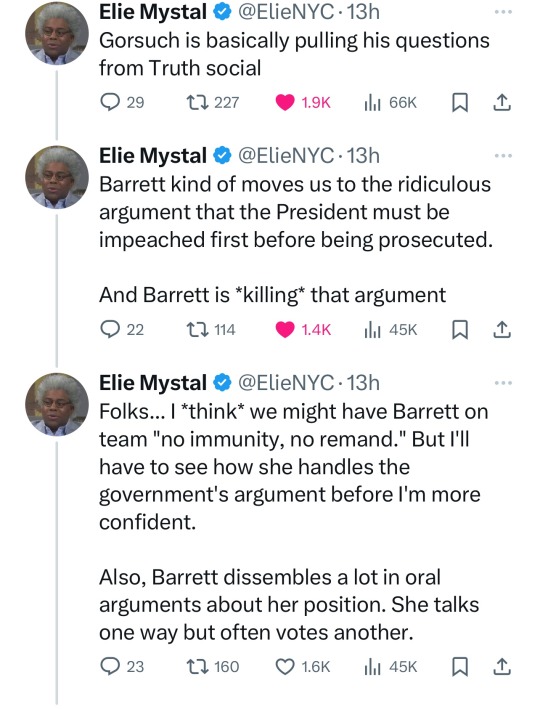
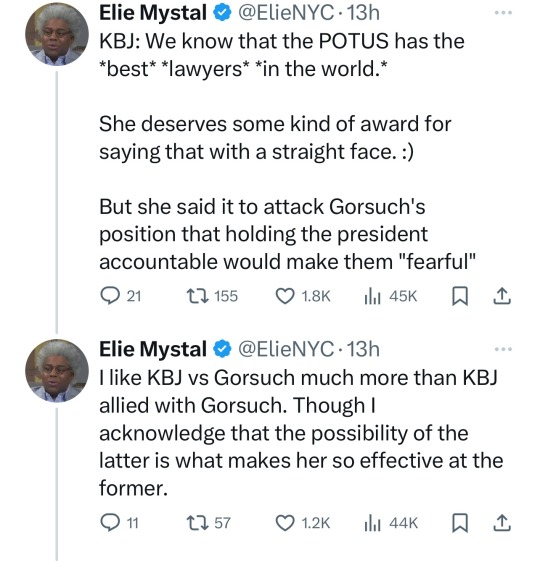
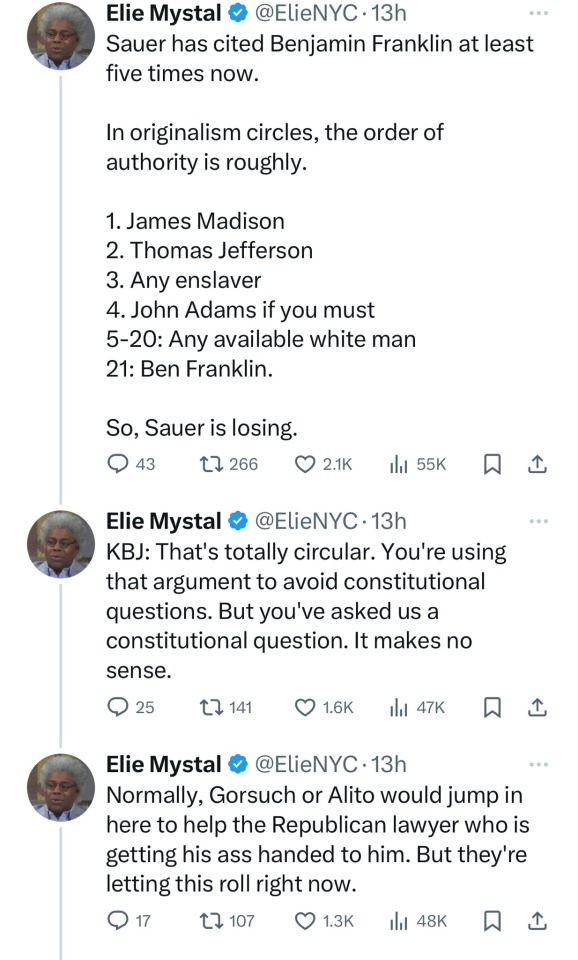
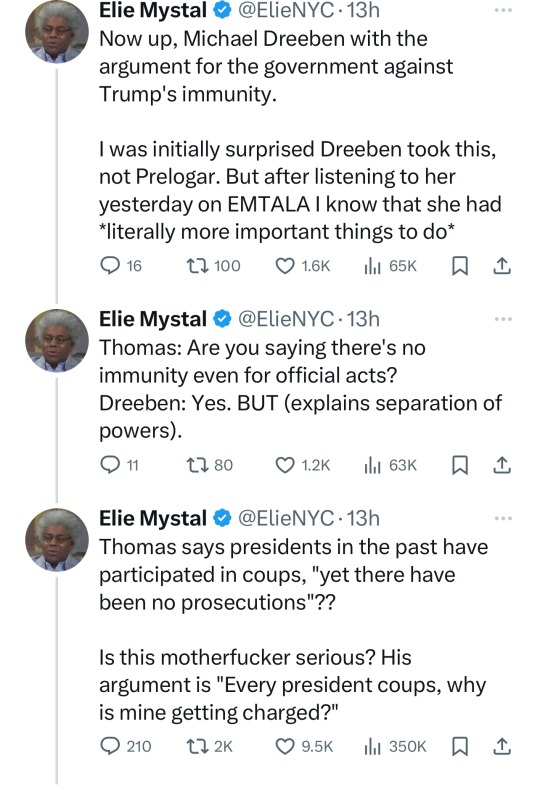
Dreeben: "BECAUSE THERE WEREN'T CRIMES!" (he didn't yell, I did, but he said "because there weren't crimes." )
Oh God, now Roberts wondering if they should send it back to the DC circuit because he's worried about presidents getting prosecuted in bad faith.
Roberts: "The court of appeals did not get into a focused consideration of what facts we're talking about or what documents we're talking about... they did not look at what courts usually look at when... taking away immunity."
Is this motherfucker serious? His argument is "Every president coups, why is mine getting charged?"
Thomas: Are you saying there's no immunity even for official acts?
And... that could be the ballgame
Roberts, Gorsuch, and Kavanaugh are more worried about a prosecutor going after a president for *political* reasons than A PRESIDENT TRYING TO OVERTHROW THE GOVERNMENT.
This is just about over.
And by "this" I mean the rule of law and by "over" I mean delayed indefinitely to help Trump.
Gorsuch suggesting that under the government's standard a president could be prosecuted for leading a "civil rights protest" in front of Congress and sought to "influence an official proceeding."
Yes, because Jan 6 and a fucking sit in are the same thing, Neil.
This is goddamn disgusting.
I'm going to keep listening because it is my literal job, but this is pretty much in the bag for Trump at this point. Remand to DC Circuit for decision on "official acts" and whether organizing a coup is one.
After November, if Trump loses, SCOTUS will return to the issue.
Alito: Are you really saying the president is subject to criminal laws like everybody else?
YES YOU DICK. THE PRESIDENT SHOULD BE SUBJECT TO THE LAWS LIKE EVERYBODY ELSE!
Alito: "I'm not talking about the particular facts of this case."
WHY? WHY THE HELL ARE NOT TALKING ABOUT THIS FUCKING CASE RIGHT IN FRONT OF YOU?
The question I'd have for the SCOTUS now is: If you do this, why would a Republican president every peacefully transfer power again?
Democratic presidents will because Democrats follow rules that don't apply to the other side. But why would Republicans just leave *ever again*?
Alito: Couldn't FDR's decision to inter Japanese Americans during WWII be charged [as a crime]?
He says that LIKE THAT'S A BAD THING?
And Dreeben is trying to say that he couldn't.
This country, and specifically this court, is a fucking joke.
Now onto self-pardons. Alito is just playing all the Fox News hits now.
I'm going to smoke. Biden should send Seal Team 6 to Mar-a-Lago because according to Alito there's no downside.
Alito just suggested that the last election was "questionably decided"
I have left my body and am texting things I can't say aloud to my friends.
Kagan is like the first person to be asking about the actual criminal acts Trump is charged with.
I assume Alito is not listening because Kagan is a woman while Gorsuch is probably sitting there emailing the New York Times because they got something wrong on the Spelling Bee.
I see the internet is unimpressed with Dreeben but that's being a little unfair. The Republican justices want to do this, there's nothing that Dreeben could say to stop them.
What he *could* be doing was making their hypocrisy more clear for the non-legal media following along.
But... SCOTUS advocates have to preserve their ability to argue another day, and blowing up the justices in one case
A: Doesn't help them actually win the case.
B: Actively hurts them in the next one.
Kavanaugh: "Like Justice Gorsuch, I'm not concerned with the here and now of this case, I'm concerned about the future."
I don't know why this is acceptable. I do know that the justices are sure they are right about ignoring the facts of THIS ACTUAL CASE.
Kavanaugh... who WORKED FOR KEN STARR... is basically saying that Jack Smith is politically motivated and his appoint in unconstitutional.
It's... maddening. And most of the media reports will not even point out this hypocrisy.
The "independent counsel" law was rewritten into our current "special counsel" law BECAUSE of the shit Kavanaugh helped Starr do! Everybody was like "that crap can't happen again."
Somebody get @neal_katyal and @MonicaLewinsky on the phone to blow up this asshole.
@neal_katyal @MonicaLewinsky Every time I try to no have a stroke listening to this bullshit, they say something even more risible and stupid.
@neal_katyal @MonicaLewinsky Kavanaugh: "President Ford's pardon. Hugely unpopular when he did it... now probably looked on as one of his better decisions."
What? WHAT? WHO THE FUCK THINKS FORD'S PARDON OF NIXON WAS A GOOD IDEA? WHEN DID I DIE AND GO TO HELL????
@neal_katyal @MonicaLewinsky This could be a men v. women 5-4 ruling.
Men: Let's kick this back to DC to further delay Trump's trial.
Soto, Kagan, Jackson: Why? That's fucking dumb.
Barrett: Ladies, I agree with you, but we shouldn't call the men fucking dumb. We should politely disagree.
@neal_katyal @MonicaLewinsky We're past the two and half hour mark for an argument where the Republican justices made their decision when they were appointed, some of them decades ago.
@neal_katyal @MonicaLewinsky KBJ is closing by trying to answer all of Gorsuch's questions, which would be effective if Gorsuch operated in good faith. But... he doesn't. So...
@neal_katyal @MonicaLewinsky I had hoped that *one* of the liberal justices would have made the point from the Common Cause brief, highlighting that the whole point of what Republican justices are doing is to give Trump delay.
Not a persuasive argument for the justices, but good for the media to hear.
@neal_katyal @MonicaLewinsky The case is submitted. Court doesn't come back till May 9th which will be a decision day.
But I think they won't decide *this* case until July 3rd for max delay. And that decision will be 5-4 to remand the case back to DC, for additional delay.
@neal_katyal @MonicaLewinsky I wish I had better news for you. Thanks anyway for following along with our national descent into madness.
61 notes
·
View notes
Text
I haven’t seen anything about this on tumblr, so check it out:
TLDR:
- Insane Texas judge issues a ruling that revokes the FDA approval of commonly used medical abortifacient mifepristone. This was an insane ruling because (a) the plaintiffs lack standing to bring this case (b) the plaintiffs did not exhaust their appeals to the FDA, a requirement for bringing a case like this to trial (c) the statute of limitations for an appeal on the FDA’s approval ran out 16 years ago. In addition, the judge was wrong about mifepristone; it is a safe and effective method of seeking abortion.
- At the exact same time, a contrary ruling from a judge in Washington DC that requires the FDA to not change the status of mifepristone. 16 AGs of blue and purple states sued for this ruling. It directly contradicts the Texas 5th Circuit.
- The Supreme Court has issued an administrative stay of 7 days on the Texas ruling so that it can hear these cases and resolve the contradiction. Because the Texas ruling was made on such terrible legal grounds, I wouldn’t normally be concerned. However, this Supreme Court is politically motivated to eliminate abortion, so who can say?
- If you need a medical abortion, seek it NOW.
#fun fact: the Texas court of appeals released its ruling at midnight so fewer people would see it#you may start hearing about this next week but it’s incredibly important#if mifepristone becomes unavailable then all abortion would have to be surgical 🙃#op#abortion
172 notes
·
View notes
Text
Reuters:
A US appeals court on Friday rejected an emergency bid by TikTok to temporarily block a law that would require its Chinese parent company ByteDance to divest of the short-video app by 19 January or face a ban on the app. TikTok and ByteDance on Monday filed the emergency motion with the US court of appeals for the District of Columbia, asking for more time to make their case to the US supreme court. Friday’s ruling means that TikTok now must quickly move to the supreme court in an attempt to halt the pending ban. The companies had warned that without court action, the law will “shut down TikTok –> one of the nation’s most popular speech platforms –> for its more than 170 million domestic monthly users”. “The petitioners have not identified any case in which a court, after rejecting a constitutional challenge to an Act of Congress, has enjoined the Act from going into effect while review is sought in the Supreme Court,” Friday’s court order said. TikTok did not immediately respond to a request for comment.
The DC Circuit Court rejects TikTok’s bid to pause a law that would ban the app.
7 notes
·
View notes
Text
The federal appeals court in Washington, DC, on Tuesday upheld the conviction of the Cowboys for Trump founder who entered the restricted area of the US Capitol on January 6, 2021, saying rioters didn’t have to know the Secret Service was protecting then-Vice President Mike Pence inside when they breached the area. The case is among a handful that tested the foundational approach the Justice Department took to prosecute hundreds of Capitol rioters, and the decision has been long-awaited since it was argued last December by those handling cases coming through the DC federal court. It also strengthens federal protection the Secret Service can offer, by defining more clearly the law around trespassing in areas where public officials are being protected. “The basis of the Secret Service’s authority to prevent access to designated areas for the safety of its protectees … need not be in the mind of the trespasser,” DC Circuit Judge Nina Pillard wrote in the opinion Tuesday. The unsuccessful challenge to the law was brought by Couy Griffin, a New Mexico local official who organized a group called Cowboys for Trump, who jumped a stone wall outside the Capitol to board the inauguration stage. Griffin was convicted of two misdemeanors, including the trespassing charge, and was sentenced to 14 days in jail and a year of supervised release. “In [Griffin’s] view, the statute also requires proof that he knew why the Capitol grounds were so restricted when he entered or remained there —i.e. that a Secret Service protectee was or would be temporarily visiting the Capitol grounds. We decline to adopt such a rule,” Pillard wrote in the 2-1 opinion. “Griffin’s approach would surely hinder the Secret Service’s capacity to handle the full range of potential threats.”
7 notes
·
View notes
Text
Maryland’s largest school district does not have to allow parents to opt their K-5 children out of classes and books that discuss LGBTQ topics like sexuality and gender, at least for now, a federal appeals court ruled on Wednesday.
The 2-1 ruling by the 4th U.S. Circuit Court of Appeals affirmed a lower court decision denying a preliminary injunction on the basis that the parents had not shown how the policy – initiated by the Montgomery County Public Schools (MCPS) board – would violate their children’s First Amendment right to free exercise of religion.
The parents had argued that refusal to provide an opt-out from their children’s exposure to LGBT-themed books and related discussions violates federal and state law.


Some of the book titles include "The Pride Puppy," "Uncle Bobby's Wedding," and "Born Ready: The True Story of a Boy Named Penelope."
The parents argued that the books contradict their religious duty to train their children in accordance with their faith on "what it means to be male and female; the institution of marriage; human sexuality; and related themes."
The litigants - three sets of parents who are Muslim, Jewish and Christian, along with a parental rights organization -- argue that the responsibility for what their children learn should fall to them, instead of the schools.
However, the court ruled that the mere exposure to ideas contrary to one’s faith is not enough of a burden to implicate the First Amendment and that exposure to issues that one disagrees with, even for religious reasons, is "part of the compromise parents make when choosing to send their children to public schools," the ruling states.
"We take no view on whether the Parents will be able to present evidence sufficient to support any of their various theories once they have the opportunity to develop a record as to the circumstances surrounding the Board’s decision and how the challenged texts are actually being used in schools," U.S. Circuit Judge G. Steven Agee, President George W. Bush appointee, wrote for the majority in the opinion.
"At this early stage, however, given the Parents’ broad claims, the very high burden required to obtain a preliminary injunction, and the scant record before us, we are constrained to affirm the district court’s order denying a preliminary injunction."
U.S. Circuit Judge A. Marvin Quattlebaum, Jr., who was appointed by former President Trump, dissented, writing that he disagreed with the district court motion finding the parents failed to establish that the board burdened their First Amendment rights.
"The parents have shown the board’s decision to deny religious opt-outs burdened these parents’ right to exercise their religion and direct the religious upbringing of their children by putting them to the choice of either compromising their religious beliefs or foregoing a public education for their children," Quattlebaum wrote.
"I also find that the board’s actions, at least under this record, were neither neutral nor generally applicable. Finally, I find the parents have established the other requirements for a preliminary injunction. So, I would reverse the district court and enjoin the Montgomery County School Board of Education from denying religious opt-outs for instruction to K-5 children involving the texts."
Eric Baxter, a senior counsel and vice president at the Becket Fund for Religious Liberty which is representing the parents, tells Fox 5 DC that the group is disappointed with the decision and says the themes are inappropriate for students.
"They involve issues around sexuality that are simply too mature for such young children," Baxter said.
Baxter tells The Hill they plan to appeal the ruling.
"The court just told thousands of Maryland parents they have no say in what their children are taught in public schools," Baxter tells the publication. "That runs contrary to the First Amendment, Maryland law, the School Board’s own policies, and basic human decency."
MCPS, which is the wealthiest district in Maryland, announced in 2022 efforts to include an LGBTQ-inclusive reading list as part of its English language arts curriculum. The decision sparked several rallies pushing for the school district to put the opt-out policy back in place.
Bethany Mandel, a mother and contributing writer for Deseret News, told "Fox & Friends First" last year that she believed it's a parent's right to tackle controversial topics, including sexuality and gender ideology, with their children on their own terms.
"Some of the books were first, second, third-grade read-aloud books about transgender ideology, about sexuality," Mandel told Carley Shimkus. "Some of the parents who spoke in favor of banning the opt-out said… 'I'm gay, and a book didn't make me gay and... There's no way that your child, if you shield them in this manner, can sort of operate in the outside world,' and that's not what anyone is asserting."
"No one thinks that our kids can turn gay by reading a book. What we're asserting is that children are best learning about these sort of tricky, sticky subjects from their parents, and their parents should have a right to determine how their kids are first introduced to this," she continued.
14 notes
·
View notes
Text

Barbara E. Pope (January 1854 - September 5, 1908) was born free to former enslaved Hannah and Alfred Pope in DC. Her parents were enslaved in New Jersey and her father, Alfred, became famous as one of a group of enslaved people who tried to escape in 1848 on the schooner Pearl.
She began writing short stories, and four of her works were printed in 1881 in the weekly women’s publication, Waverly Magazine. She worked at Tuskegee Institute for one year (1884-85) before she returned to teaching in Washington. She was assaulted by a student in 1888, and she refused to allow the student back into her class without an apology. When she did not find the student’s apology to be sufficient enough to match his actions, she resigned. She was making a comfortable living publishing fiction.
In 1906, she boarded a train at Union Station, headed toward Paeonian Springs, Virginia, to vacation. She noticed that the “Colored Car” was small and uncomfortable, and the seats faced backward. She chose to sit in the main compartment of the train, despite her awareness of Virginia’s Jim Crow laws. As soon as the train crossed over the Potomac River, the train conductor asked her to move to the “colored” car, and she refused. She was arrested at the Falls Church station and fined $10.
Members of the newly formed activist group the Niagara Movement, convinced her to appeal her conviction in the Virginia Circuit Court. They argued that as an interstate traveler, she was not subject to Virginia’s Jim Crow laws. She lost the appeal but filed the case with the Supreme Court of Virginia. The Supreme Court overturned the verdict of guilty, exonerating her, and ordered the fine be refunded. She sued the Southern Railway Co. for unethical treatment when it segregated her. She asked for damages of $20,000. The Supreme Court of the District of Columbia found in her favor but awarded her $0.01.
She paid a high personal price for her actions. She lost her income and suffered scrutiny and criticism from her family. This led her to months of depression and insomnia. #africanhistory365 #africanexcellence
6 notes
·
View notes
Text
The panel was UNANIMOUS! And yes, he will try to appeal.
But because the DC circuit's ruling is so airtight it's possible SCOTUS may decline to take up any appeal. We shall see...
19 notes
·
View notes
Text
Excerpt from this story from The Nation:
Donald Trump believes that he has the Supreme Court in his back pocket. He is right. The court heard oral arguments on Thursday in Trump v. United States, the case about whether Trump is immune from prosecution over his attempt to obstruct Congress and reverse the results of the election he clearly lost. Trump is counting on delaying the trial about his crimes committed in the previous election until he gets to the next one, which he hopes to win so he can then dismiss the charges against him. The Supreme Court has done everything in its power to help Trump accomplish his goals, and that pattern continued on Thursday.
At this point, people who expect anything less than the maximum partisan thuggery possible from the Republicans justices are not paying attention—or worse, they’re actively lying to themselves and the American people about what the Roberts court has become. The question has long since ceased being “whether” the court will help Trump; the question is only “how” it will go about doing it.
Heading into oral arguments, the justices-for-Trump crowd had three ways to stand by their man: They could grant Trump absolute immunity; they could reject immunity but release their ruling as late as possible; or they could send the case back down to the DC Circuit court for an additional ruling (lawyers call this a “remand”) that would trigger another appeal and another opportunity for delay.
The first option is kind of a nonstarter. Unlike, say, the Republican judges on the US Court of Appeals for the Fifth Circuit, the Republicans on the Supreme Court are generally careful to make sure that their pro-Trump rulings cannot be turned against them later and used by a Democratic president. Giving Trump blanket, absolute immunity could be used by people like the current president, Joe Biden, to do whatever he wanted. Granted, Biden would not use the newfound power to steal an election as Trump did—Democrats are eager to follow rules that don’t apply to the other side—and the Supreme Court knows that. But still, granting future presidents total immunity from criminal prosecution sets a precedent that even Republicans can see is dangerous.
The second option of just delaying the decision rejecting Trump’s argument has always been in play. But that option might not get the Supreme Court and Trump all the way to the next election. There is a timeline, albeit an unlikely one, where special counsel Jack Smith could still get through a trial before November, so long as the court rules against Trump by the end of the term.
That brings us to the third option: Remanding the case back to the DC Circuit. This is the option that causes maximum delay of Trump’s reckoning, allowing him to avoid it entirely if he wins the next election, while still preserving the court’s ability to say that blanket immunity is unconstitutional later down the line, should Trump lose. Remand is therefore the best possible option for the Republican justices if they want to see a Republican president elected in November—and at oral arguments, most of them signaled that’s exactly what they’re going to do.
8 notes
·
View notes
Text
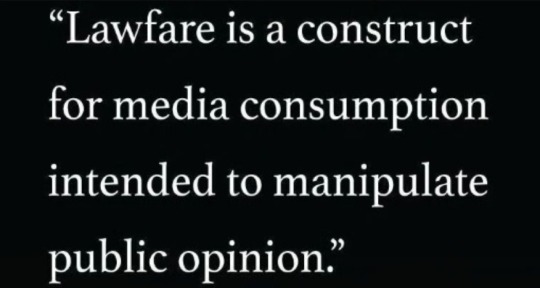
President Trump Special Counsel “Election Interference Case” in DC Suspended Indefinitely
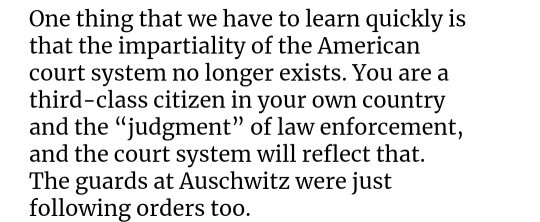
February 2, 2024
In the ridiculous federal election interference case in D.C., President Trump’s attorneys argued to the DC Circuit appellate court that President Trump holds inherent constitutional immunity. In essence, because President Trump was acquitted by the Senate of claims he incited or instigated the January 6, 2021, events, lawyers arguing under the constitution that only impeached and removed presidents can be criminally prosecuted.
From the Comments:
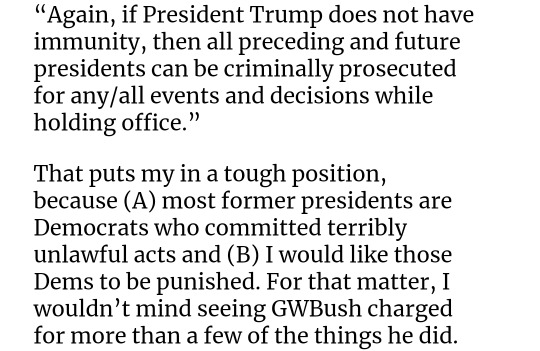
The initial 3-judge panel of the court has taken up the appeal, and all subsequent lower court activity was suspended until the constitutional issue is resolved. Again, if President Trump does not have immunity, then all preceding and future presidents can be criminally prosecuted for any/all events and decisions while holding office. This is a core issue, and the DC Circuit Court of Appeals has to tread very carefully with these ramifications at the forefront.
The decision of the 3-judge panel could also be followed by a full en-banc review by all judges in the circuit. Then, depending on their decision, it could -likely will- go even higher to the U.S. Supreme Court. All of this takes time, and the initial 3-judge appeals court have not provided any hints on their timeline.
Apparently, as a consequence, the entire trial of the case has been removed from the lower DC court docket. The removal took place within the last few days, and the Washington Post noticed the removal. This removal means the timing of the case, if at all, is completely unknown now.

WASHINGTON – Former president Donald Trump’s March 4 trial date on charges of plotting to overturn the results of the 2020 election has been dropped from the public calendar of the federal court in Washington, a sign of what has long been anticipated — that his claim of presidential immunity from criminal prosecution would delay his trial while it remains on appeal.
The change did not appear on the official criminal case docket before U.S. District Judge Tanya S. Chutkan, who has made clear since Trump filed his appeal on Dec. 7 that all trial deadlines would be suspended while he challenges the case. On appeal, Trump is arguing that the government does not have authority under the Constitution to bring charges against him for actions he took while president after the 2020 election through the Jan. 6, 2021. (read more)
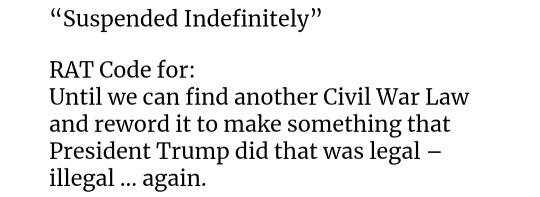
In addition to the challenges within these core issues, the Lawfare approach by Jack Smith, Mary McCord and Andrew Weissmann, faces multiple additional hurdles. These are all issues that surface when Lawfare, the application of twisted legal theory intended to manipulate public opinion, runs into the reality of ever-increasing scrutiny from courts.
Combine these fraudulent legal theories with the reality that President Trump’s status is almost certainly “presumptive presidential nominee” in the eyes of the entire judicial branch, and things change. The pretending justification for the Lawfare claims now hit the non-pretending and visible reality of political intent.
The judicial scrutiny gets even more focused, and the explanations demanded as justifications to target President Trump increase. As the calendar of the November election gets closer Jack, Mary and Andrew will have to rely on ideologically aligned black robes to maintain their Lawfare pretense. Some of the robes will not be comfortable with the demands of Jack, Mary and Andrew.
Some of the robes may not pretend, and that poses a problem for Jack, Mary and Andrew.
14 notes
·
View notes
Text

* * * *
Supreme Outrage!
April 26, 2024
ROBERT B. HUBBELL
The Supreme Court heard oral argument on Thursday regarding Trump's presidential immunity defense. For clarity, that defense asserts that the president is above the law and beyond the reach of US criminal statutes that otherwise apply to every American. To the shock of everyone—and no one—the reactionary majority expressed sympathy for Trump's defense. The hearing itself was a supreme outrage. While the reactionary majority may not adopt the most extreme version of Trump’s defense, they need not do so to grant Trump a victory. Indeed, they have already granted Trump most of what he asked for: a lengthy delay.
Before I review the debacle that masqueraded as a Supreme Court hearing, let’s skip to the most important part: We have a remedy; we need only be bold enough to claim it. The current court is illegitimate; we must effectively replace it by enlarging the Court to overwhelm the reactionary majority.
Is such a plan reasonable? Constitutional? Wise? Achievable? Yes! Mitch McConnell created an Orwellian rule to deny Democratic presidents the right to appoint Supreme Court justices—and then waived the novel rule as soon as it would apply to an appointment by a Republican. Three justices (at least) lack legitimacy: Gorsuch and Barrett, whose appointments were tainted by the McConnell rule, and Clarence Thomas, who should recuse himself from every case relating to Trump. In short, one-third of the Court that heard Trump's arguments on Thursday had no business presiding over Trump's immunity claim.
Expanding the Court requires only a majority vote in both chambers of Congress and the signature of the president. Those conditions are within our grasp in November 2024. When I first raised this prospect in 2018, it was met with shock and horror by readers, who protested that expanding the Court would undermine its legitimacy. Such objections seem quaint in light of the damage wrought by the Court in six short years.
As Ian Millhiser of Vox wrote today,
One takeaway from today's debacle of a Supreme Court argument is Democrats need to start seriously considering packing the Supreme Court. A Court that would allow Donald Trump to get away with trying to steal a presidential election cannot be trusted.
We have a long list of issues that should drive us to the polls in historic numbers in November. Add to that list that we are burdened with a lawless Supreme Court that cannot be trusted with our democracy or Constitution.
As noted above, the reactionary majority granted Trump a victory before the hearing began by refusing Jack Smith’s request to skip the intermediate step of an appeal to the DC Circuit Court of Appeals. The Court enhanced that victory for Trump by refusing to hear the matter on an expedited schedule. And now it appears that the Court will issue a fractured opinion on the last day possible (June 30) that will order the trial court to engage in pointless pre-trial fact-finding about the difference between “private” and “official” acts.
But most critically, the reactionary majority gave Trump a victory by dignifying ludicrous arguments that should have been rebuked and condemned the moment Trump's counsel gave them voice. In failing to reject those arguments out of hand, the reactionary majority bestowed upon them the veneer of legitimacy and respectability they do not deserve.
For example, Supreme Court Justice Sonia Sotomayor asked Trump's lawyer,
If the president decides that his rival is a corrupt person and he orders the military to assassinate him, is that within his official acts to which he has immunity? Trump's lawyer responded, “That could well be an official act [and therefore immune from prosecution]”
How did we arrive at this point? How is it possible that counsel for a former president could say with a straight face that a president can order the assassination of a political rival with impunity? How could the justices sit silently and ponder counsel’s answer instead of rising in horror and ordering the attorney out of the courtroom? They are feckless. They have abandoned the Constitution in its hour of need by failing to communicate the horror and repulsion such arguments deserve.
The reactionary majority also gave Trump a victory by refusing to acknowledge the constitutional urgency of the attempted coup and insurrection. Rather than focusing on the facts alleged in the indictment against Trump, the reactionary majority crafted ever more fanciful hypotheticals that had no bearing on the case at hand. As expressed by Professor Laurence Tribe,
Today’s SCOTUS argument was more like a hearing in Congress to design an immunity law for future presidents, with Justice Kavanaugh saying “We’re not taking about the present case” and Justice Gorsuch saying “We’re writing rules for the ages” and Justice Alito joining in.
Only Justice Jackson reminded her colleagues that deciding this case was the Court’s task and that it might not be cool to use it as a vehicle for “answering in advance all these abstract questions”!
By engaging in fantasy rather than focusing on the facts at hand, it is inevitable that the Court will send the case back to the trial court for pre-trial fact finding—an outcome that will ensure the case will be delayed until after the election. The Court will thus deny all Americans the opportunity to cast their vote with the benefit of a jury verdict on Trump's guilt or innocence.
Justice Alito reached the pinnacle of bad faith by arguing that not��granting immunity to Trump would increase the likelihood that a future president would try to stay in power. Huh? Every president before Trump relinquished power voluntarily without benefit of presidential immunity. If Trump is told he has absolute immunity and wins a second term, what motivation would he have to leave office—ever?
Alito also summited the peak of hypocrisy. In Dobbs, he wrote that there is no constitutional right to an abortion, reasoning as follows:
Constitutional analysis must begin with “the language of the instrument . . . The Constitution makes no express reference to a right to obtain an abortion . . . .
But the Constitution make no reference to “presidential immunity.” As counsel for Jack Smith argued,
There is no immunity that is in the Constitution, unless this Court creates it today.
Do not expect blatant hypocrisy to slow Alito’s headlong embrace of presidential immunity that appears nowhere in the Constitution. Alito knows no shame in service of his reactionary agenda.
For additional discussion of the oral argument and potential outcome, see
Ian Millhiser in Vox, The Supreme Court is likely to place Donald Trump above the law in its immunity case (excellent legal summary), and
Chris Geidner at Law Dork, SCOTUS approach to Trump's immunity claim likely to delay D.C. case further (substack.com) (deep dive into argument by counsel and questions by justices).
Millhiser predicts an outcome along the following lines:
At least five of the Court’s Republicans seemed eager to, at the very least, permit Trump to delay his federal criminal trial for attempting to steal the 2020 election until after this November’s election. And the one GOP appointee who seemed to hedge the most, Chief Justice John Roberts, also seemed to think that Trump enjoys at least some immunity from criminal prosecution.
As summarized by Josh Marshall of Talking Points Memo, The Court is Corrupt. Say It With Me. Per Marshall,
The Roberts Court is a corrupt institution which operates in concert with and on behalf of the Republican Party . . . That’s the challenge in front of us. . . . But things become more clear-cut once we take the plunge and accept that fact.
The courts are not going to save us. The reverse is true. A significant portion of the federal judiciary has been corrupted and undermined by judges loyal to a reactionary religious and partisan agenda above all else. They view the Constitution and statutes as convenient “talking points” when they advance their agenda and disposable trifles when they do not.
Our remedy is at the ballot box. We must give Joe Biden control of Congress and a mandate to reform the federal judiciary—starting with the Supreme Court. We can achieve that goal if we are disciplined and tenacious. Put aside all disagreements and reservations to ensure Democrats win control of the executive and legislative branches in 2024. Then we can begin the long, slow work of repairing the damage inflicted in a few short years by the reactionary majority empaneled by Trump, McConnell, and The Federalist Society.
[Robert B. Hubbell Newsletter]
#Robert B. Hubbell#Robert B. Hubbell Newsletter#SCOTUS#corrupt SCOTUS#Criminal SCOTUS#presidential immunity#the US Constitution#equal under the law#rule of law
4 notes
·
View notes
Text
Republicans and Democrats sank ungodly amounts of money into creating content for TikTok this election year, but there’s a chance the app might not be around in the US come next cycle. Or even president-elect Donald Trump’s inauguration in January.
Quickly, a refresher: President Joe Biden signed the Protecting Americans from Foreign Adversary Controlled Applications Act in April, creating the state of affairs we find ourselves in today. The law put in place a system that would ban TikTok if the app’s parent company, Bytedance, didn’t sell to a US-based owner by January 19, 2025. Once that deadline rolls around, the president can decide to extend it an additional 90 days. We’re supposed to find out by tomorrow if a federal appeals court will uphold the law requiring Bytedance to sell off its stake.
Soon, we’ll know whether the court will strike down the ban bill or if TikTok’s fate is left in the Trump administration’s hands.
Right now, two things stand in the way of this ban going into effect. First, the deadline. And second, a lawsuit. Shortly after the bill became law, TikTok sued the US government for violating the free speech protections of the company and its users by, effectively, banning the app. That’s the decision we’re waiting on this week.
There are a few different outcomes that could play out. The court could agree with TikTok’s arguments and strike down the law on First Amendment grounds. If that were to happen, TikTok would be safe unless the Justice Department decides to appeal the decision to the Supreme Court or the full DC circuit. Even if the feds appealed, it could take months or years before the justices take up the case, leaving us in an even lengthier limbo.
The court could also uphold the law, setting TikTok up for an outright ban. But if the court sides with the Justice Department, the incoming Trump administration may still find a way to keep the app around.
In September, Trump posted to Truth Social, saying “FOR ALL OF THOSE THAT WANT TO SAVE TIK TOK IN AMERICA, VOTE TRUMP!” (caps his, not mine). “I’m a big star on TikTok,” he said in the attached video. It was an odd statement coming from the man who was the first president who tried to ban the app. But according to The Washington Post, the Trump administration now plans to find a way to halt any ban of TikTok once the president-elect takes office, though it hasn’t announced any official plans.
Trump warmed up to TikTok over the course of the election year, promising to protect the beloved app. One of the TikTok’s biggest investors, billionaire Jeff Yass, was also one of Trump’s biggest donors. He also used it to his advantage: Over the summer, Trump joined TikTok and racked up millions of followers and collabs with popular streamers that played a huge role in his campaign’s appeal to young voters. His many podcast appearances with people like Joe Rogan, the Nelk Boys, and Andrew Schultz were also clipped and shared in bite-size pieces throughout the app.
More than 170 million Americans use TikTok, according to the most recent numbers shared by the company. Only 32 percent of Americans support a TikTok ban, according to a recent Pew survey. When a similar study was conducted in May 2023, 50 percent of Americans supported it.
Trump’s inauguration is scheduled for January 20, the day after the deadline to give TikTok more time to find a buyer. I’d bet that Biden would decide to extend it, making TikTok’s future Trump’s problem, but the current president hasn’t given any signals on what he could do. The White House did not respond to a request for comment from WIRED.
While Trump may have won TikTok this cycle, Democrats don’t see the app as a lost cause. In fact, the Democratic strategists I’ve spoken to have argued that a presence on the app is more necessary than ever.
“I’m against the ban. Not only will it hurt us with younger voters, it will eliminate a channel where Democrats can compete to get their message out,” says Ryan Davis, cofounder and chief operating officer at People First, a political influencer and relational marketing firm that partnered with the Biden and Harris campaigns. “Trump may have won TikTok in 2024, but it’s a channel Democrats demographically should be highly competitive on.”
I genuinely have no idea whether TikTok will come out on top this week. When oral arguments were presented in September, the judges didn’t sound too sold on the idea that the law was, well, unlawful. More likely than not, we’ll still be stuck in this limbo of not knowing whether we’ll be able to scroll and watch important and groundbreaking content like this.
10 notes
·
View notes
Text
Dr. William L. Bainbridge;
Ph.D., former CEO & Distinguished Research Professor at School Match Institute - University of Dayton (2001-2018)Ph.D., former CEO & Distinguished Research Professor at School Match Institute - University of Dayton (2001-2018)
With the presidential immunity case the SCOTUS was given an iron-clad ruling from the DC circuit court. It did not need to hear this case at all.
If it believed that, for reasons of legitimacy, it needed to weigh in, the Court could have granted cert to this appeal on the narrow question of whether or not Donald Trump, in this particular case, could claim immunity.
Instead, the Court granted cert on the widest grounds possible, giving itself the scope to define presidential immunity for all time.
Kim Wehle talked about this choice last night and it is striking how the conservatives on this Court were eager for the chance to create precedent.
“We’re writing a rule for the ages,” Justice Neil Gorsuch said during arguments.
But no one asked Gorsuch to write a rule for the ages.
The Court was given a narrow question to decide and the Court’s conservatives chose to widen the aperture as much as possible so that they could make right some cosmic wrongs they see in American law.
Which is exactly what conservatives used to complain that liberal judges did.
#right wing extremism#2024 presidential race#constitution#congress#politics#donald trump#supreme court#corporate greed
3 notes
·
View notes
Text
So, Donald Trump's lawyer said that he thinks the President's legal immunity would protect him if he ordered Seal Team Six to assassinate a political rival.
He added qualifications about "He could be charged if Congress already impeached and convicted him," but that has a loophole where the President could resign if he was at risk of actually getting impeached and thereby get off scot-free.
Some commentators argued that Seal Team Six wouldn't actually listen to that assassination order, but that seems like shaky ground on which to justify letting that be legal. Others point out that this contradicts an argument Trump made earlier, about how Congress shouldn't impeach him because that's not actually necessary to pursue criminal charges, which is interesting but not that important.
What seems important to me is that Trump's legal team is openly admitting that their rhetorical positions only make sense if the President can get away with assassinating political rivals. Concerning. I hope they lose!
https://thehill.com/regulation/court-battles/4398223-trump-team-argues-assassination-of-rivals-is-covered-by-presidential-immunity/
3 notes
·
View notes
Text
Lisa Needham at Public Notice:
It finally happened. Judge Aileen Cannon, who has been telegraphing for months that she was committed to finding a way to get Trump off the hook in his classified documents case, came through for her guy. In a sprawling 93-page opinion, Cannon threw out the charges against the former president, agreeing with Trump that Special Counsel Jack Smith’s appointment was unconstitutional. Since Trump stuffed the federal judiciary full of Federalist Society true believers, those courts are nothing but Calvinball. There are no longer any fixed rules and precedent doesn’t matter. What does matter to judges like Cannon is ensuring that a hard-right evangelical worldview becomes the rule of law in America and that Donald Trump is preserved at all costs.
Cannon’s opinion is a joke
There’s little to no legal support for Cannon’s decision. In short, her ruling turns on the assertion that a special counsel is a “principal,” not an “inferior” officer. The former are appointed by the president and confirmed by the Senate — basically the same as cabinet appointments. Inferior officers generally have the same confirmation requirements unless Congress has authorized a head of a cabinet department to make the appointment. In that instance, Senate confirmation isn’t necessary. The notion that the head of the Department of Justice can appoint special counsels as needed has been settled since the Watergate era. Indeed, if Senate confirmation were always required, special counsel appointments would become nearly impossible, as the Senate is basically non-functional thanks to the filibuster. Additionally, under Cannon’s view, if the Senate is held by the party in opposition to the current occupant of the White House, they essentially get a veto over every special counsel nomination.
The argument that special counsel appointments are unconstitutional if it makes Republicans sad has been pushed by conservative litigants who wanted to block Robert Mueller from investigating Russian interference in the 2016 election. As Quinta Jurecic noted at Lawfare, when the DC Circuit issued its appellate opinion in 2019, four other federal courts had already considered the matter, agreeing that the special counsel’s appointment was proper. The architect of this anti-special counsel argument is Stephen Calebresi, one of the founders of the Federalist Society. Calebresi has shopped it around quite a bit, with major law review articles in 2018 and 2019 arguing Mueller’s appointment was improper and an amicus brief to the Supreme Court in Trump’s presidential immunity case. Recall that Cannon’s decision to entertain the Trump appointments clause argument led to an extremely odd hearing where Cannon allowed amici — outside third parties like Calebresi — to present arguments in favor of Trump’s position. That’s a highly unusual step and telegraphed either that Cannon didn’t know what she was doing, was deliberately to bolster her inevitable decision in favor of Trump, or both.
[...] Not content to deal with the case at hand, Cannon also decided she should go back to the 1980s and retroactively declare that the appointment of Lawrence Walsh, who investigated the Reagan Administration’s role in the Iran-Contra affair, was invalid. So, too, with Robert Mueller’s appointment as special counsel examining Russian interference in the 2016 election. The constitutionality of Mueller’s appointment had already been addressed by a federal appellate court five years ago when the DC Circuit Court of Appeals upheld Mueller’s appointment. However, yesterday’s opinion is very clearly Cannon’s job interview with Trump, and she’s writing this for an audience of precisely on person, so why not throw Trump some red meat about Mueller as well? Having disposed of decades of special counsel law, Cannon wasn’t left with much in the way of precedent. Perhaps that’s why she had to lean hard on Justice Clarence Thomas’s concurrence in the presidential immunity case to reach her preferred conclusion.
[...] Special counsel Jack Smith has already indicated that the DOJ will be appealing the dismissal to the Eleventh Circuit Court of Appeals. Recall that the Eleventh Circuit overturned Cannon's previous ruling in this matter. Cannon granted Trump’s request that a special master review all the classified material Trump absconded with, which dragged the case to a halt. The Eleventh Circuit was not happy with this, saying, “We cannot write a rule that allows any subject of a search warrant to block government investigations after the execution of the warrant. Nor can we write a rule that allows only former presidents to do so.” And this is the core of the problem: People like Aileen Cannon are perfectly happy with a rule that only applies to Donald Trump. Indeed, Cannon’s order already states that “the effect of this Order is confined to this proceeding.” Those of us who lived through the 2000 Bush-Gore recount case will recall that the Supreme Court tried to create a similar firewall between their bad and self-serving ruling and the possibility it might ever be used against Republicans instead of just Democrats. In Bush v. Gore, when handing the presidency to George W. Bush, the Court wrote that “our consideration is limited to the present circumstances, for the problem of equal protection in election processes generally presents many complexities.” See? Calvinball. The giveaway of the presidency to George W. Bush only applies to George W. Bush. The destruction of the special counsel process only applies to Donald Trump. If Republicans need either of these issues to go the other way in a court of law, they just have to point to Cannon’s language limiting it to this instance only. Cannon’s timing, whether a product of her overall incompetence or a deliberate choice, is exceedingly favorable for Trump. Even if Smith prevails in the Eleventh Circuit, Trump could petition his pet Supreme Court justices to review the case. No matter what, the case is DOA before the election. The process of an appeal, the result of which would ultimately only be to send the case back down for trial, will drag long past the election.
Trump-appointed judicial activist Aileen Cannon plays Calvinball to justify Donald Trump’s document theft in her United States v. Trump ruling.
#Aileen Cannon#United States v. Trump#Jack Smith#Jack Smith Special Counsel Investigation#Document Theft#Classified Documents#11th Circuit Court
13 notes
·
View notes